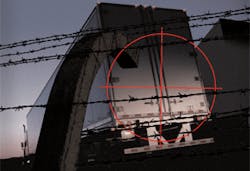Don L. Rondeau, director of Highway Watch, the Dept. of Homeland (DHS) security liaison to the highway community, will today chair a conference call aimed at harmonizing DHS agencies and local law enforcement when terrorist-related bulletins are issued to the public and private sectors.
The call will address the confusion that was wrought last week when some fuel haulers were warned by law enforcement agencies that their equipment might be used as weapons for an imminent terrorist attack on specific cities around Sept. 11, only to be later told by DHS that the threat was unlikely.
See Sept. 11 truck bomb threat downgraded.
The original bulletin distributed to law enforcement agencies on Aug. 9 by the Federal Bureau of Intelligence (FBI) warned of an “imminent” threat but was later downgraded to “not likely” by DHS. That assessment hasn’t changed since.
“Some law enforcement officials who received [FBI’s Aug. 9 bulletin] chose to distribute it to industry without consulting with Highway Watch,” Rondeau told Fleet Owner. “We think some of our law enforcement teammates felt that vetting these reports can’t hurt if it reminds [the private sector] to remain vigilant. But the Highway Watch program alone receives hundreds of reports per month—and we’re just one agency. If we were to push those hundreds of reports we get to the public without vetting them, we’d create panic, or worse, desensitize Americans so that when it’s time to mobilize, they won’t do it.”
Because of this, Rondeau is seeking to extend Highway Watch’s outreach to local law enforcement to ensure that a repeat of the confusion caused by last week’s bulletin doesn’t occur. “We’re going to recommend that our counterparts use us more in the vetting of transportation-related threats,” Rondeau continued. “We’d like to see law enforcement liaison with a federal agency prior to releasing threat reports-- and have the proper Dept. of Homeland Security agency assess the document.
“There could be an element within DHS that could challenge another element on the credibility of a report,” said Rondeau, stressing that DHS agencies must work to reach a consensus on credible threats. “That puts the private sector in the position of determining who’s correct. The law enforcement community has to work together to give a message that is consistent and focused. Otherwise, [the private sector] gets confused and could lose faith in our ability to vet information. That impacts credibility, and would essentially put us in the position of crying wolf.”
